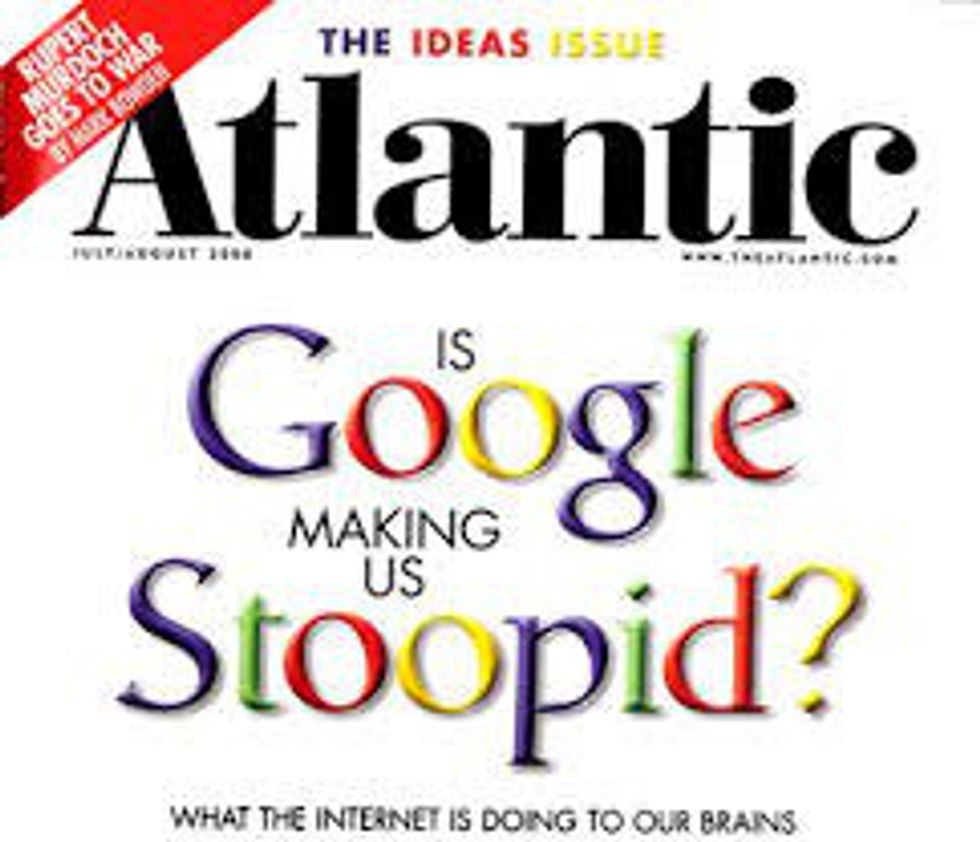I am currently writing this article on Google Drive, and it is running very smoothly, constantly helping me with the various tools it offers (such as auto correcting, linking, and formatting). By being able to fix almost all of writing’s small insignificant problems with an instantaneous click of a mouse, I can focus on using eloquent language and conveying the strong messages I plan on destroying Nicholas Carr’s argument with (I was going to say “descriptive language”, but with the help of an online thesaurus I decided eloquent would be more appropriate).
In the July/August 2008 issue of "The Atlantic", Nicholas Carr released an article called “Is Google Making Us Stupid?” which discussed all the negative effects that modern day technology, and especially the internet, has on society’s minds today.
The biggest objection I have is that when it comes to large questions like “Is Google Making us Stupid?” Carr makes it seem like deep and undisturbed contemplation of the topic is the only part that matters in analysis, but what about the facts? He talks about how people now have developed their brains to skim and quickly locate the information they need, and even says that “My mind now expects to take in information the way the Net distributes it: in a swiftly moving stream of particles. Once I was a scuba diver in the sea of words. Now I zip along the surface like a guy on a Jet Ski.” What if the information I am getting is for the purpose of discussing and analyzing a large profound topic. What if I get on my get on my Jet Ski, and am able to easily find sources that counter Mr. Carr’s points, such as Steven Pinker’s New York Times Article, “Mind Over Mass Media,” which compares modern day media panic to other unwarranted historic hysteria (such as other past technologies or the myth that comic books caused violence in the 50’s) and explains the absurdity of people applying the “you are what you eat” logic to how the internet affects the brain. What if I get on my totally awesome speed boat and find the Huffington Post article by Shaahin Cheyene, which discusses the result of an UCLA experiment that proved the internet was “more stimulating [to the brain] than reading a book,” and actually has positive effects on the brain. The article even says “The results of this study inspire the possibility that, in the future geriatric patients may be able to keep their brains active by surfing the Web.” Now I could stand on my fast luxury yacht and laugh at Carr’s entirely pessimistic view of the internet’s effect on the brain, while pointing to the proof I have assembled that disprove his view.
Facts are important to a good discussion or debate, without them it is like arguing with a child. If the child spends hours and days of his life only contemplating and justifying the existence of Santa Claus, nothing else, that just means he or she has wasted that time when they could have looked it up or just enjoyed that time by playing with friends (possibly looking at silly videos [this time it is a sloth making weird noises]). If you clicked on that link and are still reading and understanding my points, then you are proving that one can still operate as an intellectual human even with the internet’s interference. Sure it distracted you, but you could come back and comprehend all the points presented in this article. Insignificant distractions mean very little if you lose no time and you are better prepared for your discussions and philosophies. Google isn’t debilitating us, it is helping us become more efficient in our arguments and deliberations, especially arguments with people who pose questions like, “Is Google Making us Stupid?”



























